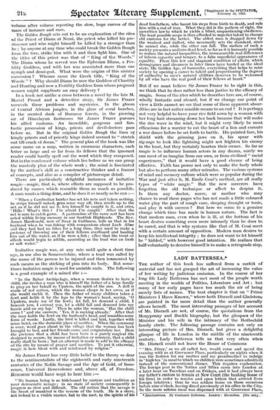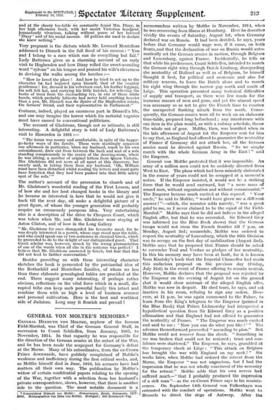LADY BATTERSEA.*
Tim author of this book has suffered from a surfeit of material and has not grasped the art of increasing the value of her writing by judicious omission. In the course of her long life Lady Battersea has met most of the people worth meeting in the worlds of Politics, Literature and Art ; but many of her early pages have too much the air of being merely lists of names. The best chapter is that on Prime Ministers I Have Known," where both Disraeli and Gladstone are painted in far more detail than the author generally allows herself. The most interesting passages of her account of Mr. Disraeli are not, of course, the quotations from the Monypenny and Buckle biography, but the glimpses of the Minister and his wife in the intimacy of the Rothschild family circle. The following passage contains not only an interesting picture of Mrs. Disraeli, but gives a delightful glimpse of life in London in the middle of the nineteenth century. Lady Battersea tells us that very often when Mr. Disraeli could not leave the House of Commons
" ' Mrs. Dizzy,' as we all called her, would come and spend the evening with us at Grovsenor Place, particularly on nights when it was the fashion for my mother and my grandmother to indulge in high tea ' (a meal to which we children were sometimes admitted) instead of the conventional dinner. This requires explanation. The foreign post in the 'forties and 'fifties came into London at a later hour on Tuesdays and on Fridays, and it had always been my father's custom to remain at New Court (the banking house of his firm) in order to receive and open letters that arrived froin foreign relatives ; thus he was seldom home on those occasions before nine o'clock, having dined previously at his office in the City. So the more solemn meal was dispensed with at Grosvenor Place, • lientinistenoes, )3' Constance Battersea. London : Macmillan. 1215.
and at the cheery tea-table we constantly found Mrs. Dizzy, in her high afternoon frock, with her smart Victorian headgear, loquaciously vivacious, talking 'without pause of her beloved Dizzy' and of his social success. Of politics she used to declare she knew nothing."
Very pregnant is the dictum which Mr. Leonard Montefiore addressed to Disraeli in the full. flood of his success : " You and I belong to a race which can do everything but fail." Lady Battersea gives us a charming account of an early visit to Hughenden and how Dizzy rolled the sweet-sounding word "sylvan" on his tongue and praised his wife's cleverness in devising the walks among the beeches :—
"How he loved the place ! And how he tried to act up to the character he had imposed upon himself, that of the country gentleman ! for, dressed in his velveteen coat, his leather leggings, his soft felt hat, and carrying his little hatchet, for relieving the barks of trees from the encroaching ivy, in one of those .white hands, which probably hitherto had never held anything heavier than a pen, Mr. Disraeli was the Squire of the Hugheriden estate, the farmers' friend, and their representative in Parliament."
Costume, indeed, played an enormous part in Disraeli's life, and one may imagine the horror which his sartorial vagaries Must have caused to conventional politicians.
The account of Gladstone, though not so intimate, is still interesting. A delightful story is told of Lady Battersea's visit to Hawarden in 1581:=
" The house was roomy and comfortable, in spite of the happy- go-lucky ways of the family. These were startlingly apparent one afternoon in particular, when my husband, much to his own astonishment, drew out from between the back and seat of a sofa standing conspicuously in the centre of the drawing-room, where he was sitting, a number of original letters from Queen Victoria. Mrs. Gladstone did not seem at all upset at this discovery, but merely said, in taking them from my husband, Oh, William must have been disturbed whilst reading the letters and must quite have forgotten that they had been pushed into that little safety spot of the sofa.' "
The author's account of the procession to church and of Mr. Gladstone's wonderful reading of the First Lesson, and of how she and her host changed books in the library and be became so interested in hers that he would not give it back till the next day, all make a delightful picture of a great figure, of whom the younger generation will probably acquire an erroneously pompous idea. Very entertaining also is a description of the drive to Chequers Court, which was taken when Mr. and Mrs. Gladstone were staying at Aston Clinton, and of how in the Long Gallery
" Mr. Gladstone for once disregarded his favourite meal, for he was deeply interested in a parrot, whose cage stood near the table, and who could speak one or two sentences in classical Greek, which he proceeded to do to the delight of our distinguished guest. That Greek scholar was, however, struck by the wrong pronunciation of one of the words when all else in the sentence was perfect I believe that Mr. Gladstone answered in Greek, but fear that this did not lead to further conversation."
Besides providing us with these interesting character sketches the book is permeated by the patriarchal idea of the Rothschild and Montefiore families, of whom no less than three elaborate genealogical tables are provided at the end. These suggest many interesting, if perhaps rather obvious, reflections on the vital force which in a small, dis- rupted tribe can keep such powerful family ties intact and combine them with so high a level of business acumen and personal cultivation. Here is the best and worthiest side of Judaism. Long may it flourish and prevail



































































 Previous page
Previous page